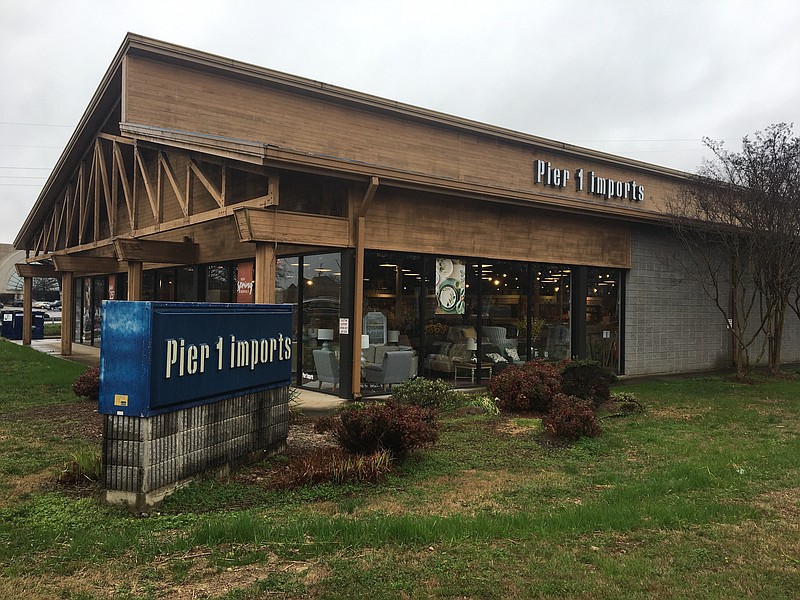Pier 1 Imports Inc. - the once-trendy supplier of home goods like papasan chairs and throw pillows - is closing 450 of its stores and seeking a new buyer after filing for bankruptcy Monday following years of sliding sales.
The Fort Worth, Texas- based retail chain has no immediate plans to close its store near Hamilton Place mall in Chattanooga. But a new list of planned store closings obtained by Business Insider shows that Pier 1 will close five Tennessee stores, 10 Georgia stores and five stores in Alabama among the 450 stores slated to be shut down in North America.
Pier 1 has been struggling with increased competition from budget-friendly online retailers like Wayfair and Amazon and discount stores like Home Goods. Pier 1 CEO Robert Riesbeck blamed the bankruptcy filing on "a confluence of operational and strategic factors," but he said the biggest problem "was a strategy launched under past management to turn to a mass-market merchandising strategy based on high-volume, low-price, lower-margin commodity items."
Riesbeck said the strategy failed to resonate with Pier 1's customers and led to a glut of inventory it couldn't move off the shelves.
The retailer said it has commitments for about $256 million in debtor-in-possession financing from Bank of America, Wells Fargo and Pathlight Capital to continue operations while it seeks bids for a March 23 sale.
"Today's actions are intended to provide Pier 1 with additional time and financial flexibility as we now work to unlock additional value for our stakeholders through a sale of the company," Riesbeck said in a statement after the company filed a Chapter 11 bankruptcy reorganization petition.
Stores closing in tri-state area
TENNESSEEKnoxvilleMadisonGermantownClarksvilleJacksonGEORGIARomeAtlantaMaconDecaturBrunswickGainesvilleAlbanyDouglasvilleValdostaALABAMADothanHooverMobileTuscaloosaFoley
Pier 1 was founded in 1962 in California, where it made its name selling incense, beanbag chairs and love beads. The company moved to Texas in 1966 and went public in 1970.
In its most recent fiscal year, which ended in February 2019, Pier 1 reported sales fell by 18% during the year to $1.55 billion. Pier 1's sales tumbled 13% to $358 million in its most recent quarter, which ended Nov. 30.
The bankruptcy of Pier 1 is the latest in a string of retail bankruptcies that have battered the shopping center industry and comes just weeks after Macy's announced plans to close another 30 of its department stores.
Shares of CBL Properties, the Chattanooga-based mall developer that owns both the Hamilton Place and Northgate malls in Chattanooga, fell to an all-time low Tuesday in response to the latest bankruptcy, closing down nearly 2.9% in trading on the Nasdaq Exchange to close below 67 cents per share for the first time.
CBL spokeswoman Stacey Keating said the mall owner has not yet been informed of any additional store closings by Pier 1 as a result of the bankruptcy filing.
In a conference call with analysts last week, CBL's CEO, Stephen Lebovitz, said the shopping center development firm is responding to the retail realignment by replacing traditional stores with restaurants, hotels, medical offices, fitness centers and even casinos.
"Retail is changing, and a result - and as a result, our shopping centers are evolving into what we call suburban town centers," Lebovitz said. "As a result of our redevelopment efforts, we are diversifying our revenue stream and working to stabilize income. Since the Bon-Ton and Sears bankruptcies in 2018, we have opened 15 new tenants in former anchor locations, adding more productive uses, and we have another dozen committed replacements either under construction or planning underway"
CBL is currently under construction, has agreements or is in active negotiations on two multifamily projects; 14 entertainment operations, nine hotels; 28 restaurants; eight fitness centers; nine medical offices and three self-storage facilities, Lebovitz said.
The Associated Press contributed to this report.
